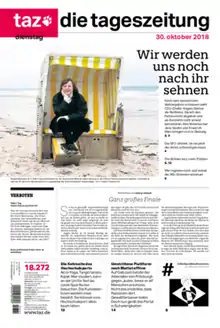Die Tageszeitung
Die Tageszeitung (German: [diː ˈtaːɡəsˌtsaɪtʊŋ], “The Daily Newspaper”), stylized as die tageszeitung and commonly referred to as taz, is a cooperative-owned German daily newspaper administrated by its employees. Founded in 1978 in Berlin as part of an independent, progressive and politically left-leaning movement, it has focused on current politics, social issues such as inequality, ecological crises both local and international, and other topics not covered by the more traditional and conservative newspapers. It mostly supports the German Green Party, but Die Tageszeitung has also been critical of the SPD/Greens coalition government (1998–2005).
 | |
 The 30 October 2018 front page of Die Tageszeitung | |
| Type | Daily newspaper |
|---|---|
| Format | Berliner |
| Publisher | taz, die tageszeitung Verlagsgenossenschaft eG |
| Editor | Barbara Junge |
| Founded | 1978 |
| Political alignment | New left, Green left |
| Language | German |
| Headquarters | Berlin |
| ISSN | 0931-9085 |
| Website | taz.de |
The newspaper's logo, a paw print, derives from the similarity of the name "taz" to a German word for paw, Tatze.
History
Die Tageszeitung was established in 1978.[1] From the beginning, Die Tageszeitung was intended to be an alternative to the mainstream press, in its own words: "irreverent, commercially independent, intelligent and entertaining." One expression of its alternative approach to journalism was the payment of unified salaries for all employees until 1991. Nowadays, employees in highly responsible positions receive bonuses. Still, salaries paid by Die Tageszeitung are considerably lower than what is paid in the rest of the industry.
WOZ Die Wochenzeitung (formerly WoZ) and Die Tageszeitung are joint editors of the German-language edition of Le Monde diplomatique as a supplement of the newspapers.[2]
Since 1992, Die Tageszeitung has been owned by currently more than 18,600 paying members. Its circulation has dropped in recent years, with subscriptions including e-paper now down to 42,000.[3] In 1995, it was the first German national newspaper to make all of the content of issue available online. Die Tageszeitung has announced that it will phase out its printed daily edition until 2022.[4]
From the beginning, Die Tageszeitung appeared in a nationwide edition as well as in a Berlin local edition. Over the years, local editorial offices for North Rhine-Westphalia, Hamburg and Bremen were added. While the latter two were merged to "taz nord" (North) the NRW-offices were closed as of July 2007.
In the 2013 elections the magazine was among the supporters of the SPD.[5]
The "Potato Affair"
On 26 June 2006 Die Tageszeitung published a satirical article on its last page, headlined Die Wahrheit (the truth) that is reserved for satire and nonsense. It was titled Polens neue Kartoffel. Schurken, die die Welt beherrschen wollen. Heute: Lech „Katsche“ Kaczynski (The new potato of Poland. Rogues who want to rule the world. Today: Lech „Katsche“ Kaczynski).[6] This article ridiculed the Polish politicians President of Poland Lech Kaczyński and Prime Minister of Poland Jarosław Kaczyński. Lech Kaczyński then cancelled talks that were scheduled between Germany, Poland and France (the Weimar Triangle), officially for reasons of sickness.
Headlines
The taz is noted for its tongue-in-cheek headlines,[7] such as:
- Oh mein Gott! (Oh my god!) – On the election of Joseph Ratzinger as Pope Benedict XVI
- Es ist ein Mädchen (It's a girl) – On the election of Angela Merkel as the first female Chancellor of Germany
- Oops – they did it again! – On the re-election of George W. Bush as President of the United States
On 5 June 2008, the paper published a picture headlined "Onkel Baracks Hütte" (Uncle Barack's Cabin) with a picture of the White House below the headline as part of an article about then-Senator Barack Obama. That headline, which made reference to the book Uncle Tom's Cabin, was perceived as racist by some of its readership.[8]
See also

Footnotes
- "European News Resources". NYU Libraries. Retrieved 24 January 2015.
- Bernard Degen (20 November 2013). "WochenZeitung (WOZ)" (in German). Historisches Lexikon der Schweiz. Retrieved 6 November 2014.
- https://meedia.de/2020/04/22/ivw-blitz-analyse-tages-und-wochenzeitungen-zeit-gewinnt-erneut-auflage-welt-bricht-voellig-ein/
- https://www.golem.de/news/nur-noch-wochenende-taz-stellt-ihre-printausgabe-wohl-bis-2022-ein-1808-135981.html
- Juan P. Artero (February 2015). "Political Parallelism and Media Coalitions in Western Europe" (PDF). Reuters Institute for the Study of Journalism. Archived from the original (Working paper) on 16 April 2015. Retrieved 8 April 2015.
- Polens neue Kartoffel. In: taz, 26 June 2006. (in German) ISSN 0931-9085
- "Happy Birthday, taz!". Die Zeit (in German). 17 April 2009. Retrieved 17 April 2009.
- Is "Uncle Barack's Cabin" racist?
- Riedel, Sunny (5 November 2018). "Plüschpinguine, Rotweinflecken und eine halbe Tischtennisplatte" [Plush penguins, stains of red wine and half a ping-pong plate]. Die Tageszeitung (in German) (11774). Berlin. p. 2. ISSN 0931-9085. Retrieved 6 November 2018.
Literature
- taz - die tageszeitung. Die Tageszeitung Verlagsgenossenschaft e. G., Berlin 1.1987,1ff. ISSN 0931-9085
- Oliver Tolmein/Detlef zum Winkel: tazsachen. Kralle zeigen - Pfötchen geben. Hamburg 1988. ISBN 3-922144-76-4
- Jörg Magenau: Die taz. Eine Zeitung als Lebensform. München 2007, ISBN 978-3-446-20942-8
- Nora Münz: Links und liebenswert. Nutzungsmotive von Lesern der tageszeitung (taz). In: Senta Pfaff-Rüdiger / Michael Meyen (Hg.): Alltag, Lebenswelt und Medien. Lit Verlag. Münster 2007. S. 215-235. ISBN 978-3-8258-0897-6
External links
- taz website (in German)